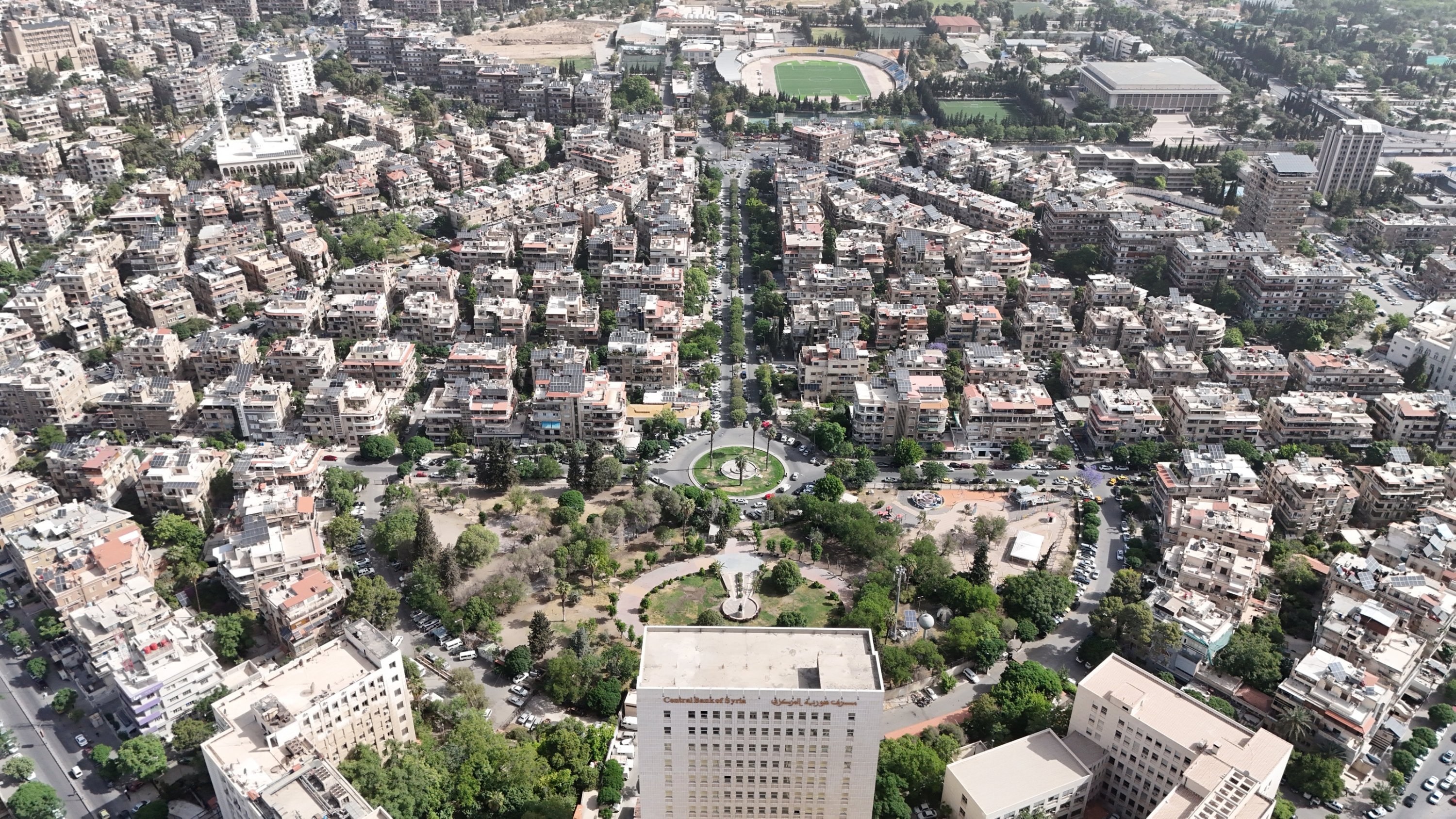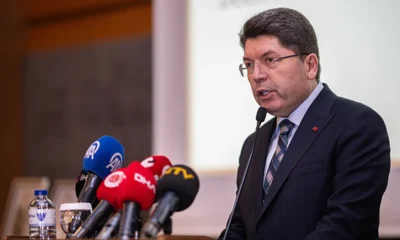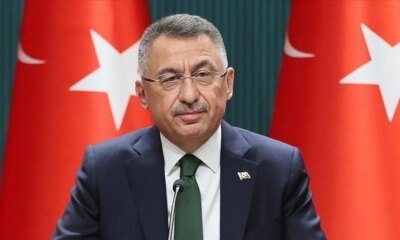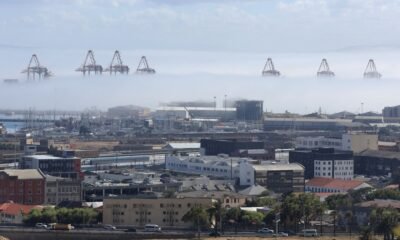Economy
Turkish firms see big opportunities in Syria amid sanctions relief
Turkish companies see big opportunities and business potential in neighboring Syria as a lifting of U.S. sanctions clears the way for investment in postwar reconstruction, but still they remain wary of certain challenges, from lingering insecurity to concerns related to banking and the tax system.
The decision of U.S. President Donald Trump to end long-standing restrictions that severed Syria from the global financial system under former President Bashar Assad is seen as a lifeline for a nation decimated by 13 years of war.
And now, construction, transportation and manufacturing firms from Türkiye appear all but poised to play a major role in repairing the damage, which the U.N. estimates at nearly $1 trillion.
“The lifting of sanctions was just an urban legend, rumors for a time. But with Trump’s announcement, everything has suddenly changed,” said Ömer Hot, a director at Istanbul-based Formul Plastik.
Last month, during his first trip abroad since returning to the White House, Trump in Saudi Arabia said the U.S. would lift sanctions on Syria. Soon after, the European Union also followed suit, and Syrians now hope the recovery after years of civil war could finally pick up its pace.
Syria’s Finance Minister Yisr Barnieh has called his country “a land of opportunities” and said the government plans to overhaul the tax, customs and banking systems to foster foreign investment and facilitate donor funding pledges.
Recently, he said Syria’s stock market will reopen on June 2, nearly seven months after anti-regime forces toppled Assad.
Interviews with officials from two dozen Turkish companies reflect both optimism over the potential of a previously sealed-off market with vast needs and a dose of caution over rushing investments in a country where, at times, even money transfers can be difficult.


Formul Plastik has received the first plastics orders from Syria, Hot told Reuters recently. He estimated that Turkish companies could end up with a quarter of Syria’s reconstruction pie.
But he faced some hurdles.”Rather than banks, there are brokers such as exchange bureaus that mediate trade payments. This model will have to be used for now,” Hot said.
Other Turkish companies at the Buildex construction materials expo in Syria’s capital, Damascus, said demand from Syrian counterparts was very high, even as they listed worries over tax rates, customs snarls, and creaking transport infrastructure.
“We are taking a calculated risk, let’s say,” said Burak Serim, regional export manager at construction materials producer Entegre Harç.
Security, investment
In the wake of Assad’s December ouster and the establishment of a government under new interim President Ahmed al-Sharaa, Türkiye is already feeling economic benefits.
Ankara has pledged to help rebuild Syria’s economy, including by providing natural gas. And Ziraat Bank, Türkiye’s top state lender, told Reuters it would step in to support its banking sector when conditions are right.
Turkish firms Kalyon GES Enerji Yatırımları and Cengiz Enerji are set to expand Syria’s power grid under a new deal valued at about $7 billion, which involves Qatari and U.S. companies.
Syria’s trade with the rest of the world all but dried up during the war. But Turkish exports to its neighbor were up 37% year-over-year in the first four months of 2025, official data shows.
In an indication of its gaping needs for construction materials, Syrian imports of Turkish machinery more than tripled and non-ferrous metals doubled. Glass and ceramics were up 73%.
Pledges of financing have, meanwhile, come in from wealthy Western nations, multilateral donors and the likes of Saudi Arabia and Qatar.
But for the most part, those are still largely promises. And Turkish company managers voiced concern that there may not be enough for all the roads, bridges, dams and power plants that must be rebuilt.
Syria’s economy shrank dramatically during the war years. And with over 90% of its 25 million people now living below the poverty line, according to U.N. agencies, the government has scant resources.
Volkan Bozay, chief executive of the Turkish Cement Manufacturers’ Association, told Reuters that much hinges on which lenders finance the reconstruction projects, but added that Turkish companies would play a major role no matter what.
“It is out of the question that we will not take advantage of the opportunities,” he said.
Beyond construction, Turkish manufacturers are also eyeing Syria as a possible hub for low-cost production.
“Lower production costs in Syria are an advantage,” said Ahmet Öksüz, a board member at Turkish textile manufacturer Kipaş.
“But Turkish and Syrian authorities should coordinate to establish organized industrial zones that will ensure entirely safe areas for manufacturers,” he added.
Questions of security in a country still in an early stage of recovery following years of war remain at the top of the list of concerns for many would-be investors.
Hakan Bucak, former Turkish-Syrian business council board director, said Syria will likely need six months to ensure security and set up bureaucratic systems.
“Security risks should be fully eliminated and investors need to feel it,” said Bucak, who is already looking to open a quarry near the northern Syrian city of Aleppo.
“If we feel safe, we have plans to invest.”
Economy
Şimşek touts Türkiye’s ‘resilience’ despite global economic uncertainty
Türkiye has remained economically resilient despite mounting global uncertainty, underpinned by free trade agreements, strong service exports and an ongoing reform agenda, Finance Minister Mehmet Şimşek said on Monday.
Şimşek, speaking at the Conference for Emerging Market Economies in Saudi Arabia, described last year as a challenging period for the global economy marked by “volatility, uncertainty, complexity, and ambiguity.”
“It’s been a difficult year with heightened uncertainty, in particular for emerging markets,” he said.
Şimşek said Türkiye is relatively resilient to global trade fragmentation, noting that about 62% of its exports are covered by the EU Customs Union and free trade pacts with 27 countries.
While not fully immune, these agreements provide partial protection, and the rest of trade is largely concentrated in nearby regions such as the Middle East, North Africa, and Central Asia.
He said Türkiye ranks among the world’s top 20 in services trade, highlighting its position as fourth in tourism and a global leader in construction and TV series exports. He stressed that services have so far been less affected by protectionism than goods, giving Türkiye an edge, and said the government is prioritizing the sector for its high added value and job creation potential.
Şimşek says Türkiye also prioritizes and invests in the field of artificial intelligence, and stated that along with infrastructure investments, they attach importance to the human capital dimension, skills development, and education.
Şimşek explained that they are also focusing on regional integration, stating that connectivity is a part of this, and that they are building new corridors.
He said Türkiye sits on the Middle Corridor from Beijing to London and is working on new routes linking the Gulf to global markets via Türkiye, adding that boosting connectivity is central to the strategy, alongside energy investments, including plans to build two or three additional nuclear power plants in the coming decades to meet rising demand driven by AI.
Economy
Ex-Prince Andrew appears to have shared UK trade files with Epstein
Andrew Mountbatten-Windsor, the younger brother of King Charles, shared confidential British trade documents with Jeffrey Epstein in 2010, leaking information to the late sex offender during his tenure as a government envoy, emails appear to show.
The former prince, 65, has faced years of scrutiny over his friendship with Epstein, a relationship that has cost him his role in the royal family, titles and home. Andrew has always denied any wrongdoing and not responded to requests for comment since the latest release of Epstein files.
In the latest batch of files released in the U.S., emails appear to show that Andrew forwarded to Epstein reports about Vietnam, Singapore and other places, which he had been sent in relation to a trip he made in an official capacity.
It was not immediately clear whether authorities were planning to open an investigation into Andrew’s sharing of information.
Trade envoys are usually barred from sharing sensitive or commercial documents under confidentiality rules.
Over the last 10 days, revelations from the Epstein files have engulfed British Prime Minister Keir Starmer in the biggest crisis of his premiership, after he appointed an acquaintance of Epstein, Peter Mandelson, as ambassador to the United States.
Like Andrew, it appears that Mandelson also shared sensitive government files from 2009 and 2010 with Epstein, and police are investigating claims of misconduct in public office.
Thames Valley Police said last week they were reviewing a new allegation against Andrew involving a woman being taken to an address in Windsor in light of the latest Epstein files.
Mountbatten-Windsor, the second son of the late Queen Elizabeth, was forced to quit all official royal duties in 2019 and, last October, Charles removed his title of prince. Andrew was moved out of his royal mansion last week.
Economy
UK borrowing costs up as investors question Starmer’s future
British government bond yields surged early on Monday as investors continued to weigh the political future of Prime Minister Keir Starmer amid the fallout from the Epstein crisis, although they later eased to move more in line with U.S. Treasuries.
Starmer’s chief of staff, Morgan McSweeney, quit on Sunday, saying he took responsibility for advising Starmer to appoint Peter Mandelson as ambassador to the U.S. despite his known links to Jeffrey Epstein.
Some in Starmer’s Labor Party are openly questioning his judgment and his future, and investors are increasingly bracing for a challenge to his leadership, raising uncertainty over the path of British fiscal policy.
On Monday, Starmer’s director of communications, Tim Allan, also resigned.
The 10-year gilt yield rose to a high of 4.554% at 08:21 a.m. GMT, up 4 basis points on the day, before easing to 4.533%, in line with a rise in 10-year U.S. Treasuries. Long-dated gilt yields, most sensitive to worries over the budget outlook, rose by similar amounts.
“The decision by his most senior adviser to fall on his sword may buy Starmer some time, but signs of widespread discontent on the backbench, compounded by diabolically bad poll results, are creating the impression that his days are numbered,” said Benjamin Picton, senior market strategist at Rabobank.
On Feb. 5, when there was a previous bout of concerns about Starmer’s future, 10-year gilt yields rose to their highest since Nov. 20 at 4.605% before retreating sharply after the Bank of England (BoE) came closer than expected to cutting interest rates in that day’s decision.
However, gilt auctions in recent weeks have shown exceptionally strong levels of demand. The sale of a five-year gilt due on Tuesday will provide the next test of investor appetite. Economic growth data on Thursday could also move the market.
Economy
Türkiye stops chicken exports after pre-Ramadan price hikes
Türkiye has decided to suspend chicken meat exports ahead of the Muslim holy month of Ramadan in a bid to stabilize domestic prices and prevent what authorities described as unjustified increases that could strain consumers.
The decision came after domestic poultry producers and sellers raised prices by as much as 15% before Ramadan, prompting the government to intervene to protect the domestic market.
The Trade Ministry said the decision aimed to support the supply-demand balance and curb volatility in food prices.
Ramadan is a month when Muslims are united in a ritual of daily fasting from dawn to sunset. This year’s Ramadan is due to start next week.
For Muslims, it’s a time of increased worship, religious reflection, charity and good deeds. Socially, it often brings families and friends together in festive gatherings around meals to break their fast.
Türkiye frequently takes temporary trade measures ahead of Ramadan, when food demand typically rises, to contain inflation and ensure a stable supply of essential goods.
Annual inflation in Türkiye has been gradually easing and lastly dipped to 30.65% in January. Still, food has been one of the main contributors to rising prices.
In a statement, the Trade Ministry said recent regional developments affecting food markets, combined with rising domestic demand and seasonal shifts in consumption patterns, have accelerated price movements in certain product groups, including poultry.
“Price developments in the poultry meat market have been closely monitored, and it has been carefully assessed whether price formation has remained within the framework of normal market conditions,” the ministry said.
“Within this framework, as a step to support the supply-demand balance in the market, measures to suspend poultry meat exports have been implemented as of today.”
The ministry added that “any practice or speculative pricing behavior that could victimize our consumers or disrupt market mechanisms through exorbitant price exploitation is being closely monitored,” noting that the necessary inspection and sanction processes were being carried out with “determination.”
Ramadan is the ninth month of the Islamic lunar calendar; the month cycles through the seasons.
The start of the month traditionally depends on the sighting of the crescent moon. This year, the first day is expected to be on Feb. 19.
Fasting is one of the Five Pillars of Islam, along with the profession of faith, prayer, almsgiving and pilgrimage.
Muslims see various meanings and lessons in observing the fast.
It’s regarded as an act of worship to attain God-conscious piety and one of submission to God. The devout see benefits, including practicing self-restraint, growing closer to God, cultivating gratitude and empathizing with people who are poor and hungry.
The daily fast in Ramadan includes abstaining from all food and drink – not even a sip of water is allowed – from dawn to sunset before breaking the fast in a meal known as “iftar” in Arabic.
Economy
After landslide win, Japan’s Takaichi may struggle to soothe markets
Japanese stocks rose to hit record highs on Monday after Prime Minister Sanae Takaichi’s landslide election win; however, experts warn that the country’s first woman leader could struggle to keep both voters and markets happy.
In its best result since its founding in 1955, Takaichi’s conservative Liberal Democratic Party (LDP) won a two-thirds majority in Sunday’s snap lower house election, according to Japanese media.
With the result, Takaichi, 64, managed to capitalize on her strong popularity since taking the helm of a moribund LDP in October and becoming Japan’s fifth premier in five years.
On Monday, the Nikkei 225 briefly jumped more than 5% to pass 57,000 points for the first time, while the yen strengthened against the dollar.
Analyst Kyle Rodda of Capital.com said the victory handed Takaichi “the mandate she was looking for for her big-spending agenda.”
Equities are “poised to benefit from higher fiscal spending but interest rates that remain accommodative and negative in real terms,” he said.
And SPI Asset Management’s Stephen Innes said: “Politically, the win hands… Takaichi’s freedom of movement and removes the need to bargain every decision down to the lowest common denominator.”
But a major reason for voters deserting the party in past elections was inflation, an unwelcome phenomenon for households after several decades of stable or falling prices.
The cost of rice, for example, doubled in 2025.
Food tax
After a $135-billion stimulus last year, economists said Takaichi’s room for manoeuvre was limited because of market concerns about Japan’s debt, which at more than twice the size of gross domestic product (GDP) is at a higher ratio than any other major economy.
The yen has also weakened, prompting speculation that Japanese authorities – potentially in partnership with U.S. officials – might intervene to provide support.
Off-the-cuff remarks by Takaichi earlier this month talking up the benefits for Japanese exporters of a weaker yen added to pressure on the currency.
In the election campaign, Takaichi floated the idea of suspending a consumption tax on food items, but this sent yields on long-term Japanese bonds to record levels.
On Sunday, she told local media further discussions were needed on such a move, which Bloomberg News reported would cost 5 trillion yen ($32 billion) in lost annual revenue.
“Most parties are in favor of reducing the consumption tax… I strongly want to call for the establishment of a supra-party forum to speed up discussion on this, as it is a big issue,” Takaichi said.
She also reiterated her mantra of having a “responsible and proactive” fiscal policy.
But she added: “We will ensure necessary investments. Public and private sectors must invest. We will build a strong and resilient economy.”
‘Betrayed’
Tetsuo Kotani at the Japan Institute of International Affairs said Takaichi could struggle to keep voters happy and that they could end up feeling “betrayed.”
“In reality, the policies of a Takaichi administration are unlikely to curb the inflation that voters expect her to address,” he warned.
“An income tax hike linked to increased defense spending will also be unavoidable. If these policies lead to a triple decline in stocks, the yen, and government bonds, people’s lives will become even more difficult.”
Takaichi has also pledged to increase defense spending as part of commitments to U.S. President Donald Trump that Japan will be less reliant on Washington.
Kotani said that because of a personnel shortage, linked to Japan’s low birth rate, this will “not amount to a fundamental strengthening of Japan’s defense capabilities.”
Marcel Thieliant at Capital Economics added that he did not expect Takaichi to embark on any new major spending splurges or tax cuts.
“(We) view the recent fiscal expansion as an attempt to bolster public support ahead of the election rather than as a sign of things to come,” he said in a note.
“With Upper House elections not due until 2028, we don’t expect any further major fiscal loosening.”
Hiroshi Shiratori, a politics professor of Hosei University, said Takaichi wanted to emulate the “Abenomics” of former premier Shinzo Abe – her mentor – of big spending and lower interest rates.
“But Abemonics was done at the time of deflation in Japan and a higher yen,” Shiratori said.
“Now is the time of inflation, and the cheaper yen exacerbating inflation, with the market reacting to worries over potential worsening of fiscal conditions,” he said.
“But not all voters understand this logic.”
Economy
Facing US tariffs, South Africa steps toward trade deal with China
China and South Africa inked a framework agreement for a new trade deal on Friday as Africa’s leading economy increasingly weighs other options following the steep import tariffs imposed on it by the U.S. and its diplomatic fallout with the Trump administration.
South Africa’s Ministry of Trade and Industry said the agreement would start negotiations over a deal that would give some South African goods, such as fruit, duty-free access to the Chinese market. The ministry said it expected the trade deal to be finalized by the end of March.
In return, the trade ministry said China will get enhanced investment opportunities in South Africa, where its car sales have seen rapid growth.
The U.S. slapped 30% duties on some South African goods under U.S. President Donald Trump’s reciprocal tariffs policy, one of the higher rates applied across the world. South Africa has said it is still negotiating with the U.S. for a better deal.
The China-South Africa deal follows others looking for alternatives to U.S. partnership in the face of Trump’s aggressive trade policies.
The announcement on the negotiations between China and South Africa came days after Trump issued a short-term renewal of a longstanding free-trade agreement between the U.S. and African nations. The U.S. extended the African Growth and Opportunity Act, which South Africa is a major beneficiary of, just until the end of the year and indicated it would be modified to fit the administration’s America First policy.
China is already South Africa’s largest trade partner for both imports and exports, while Chinese economic influence across the African continent continues to grow and it dominates in the extraction of Africa’s critical minerals that are key components for new high-tech products.
“South Africa looks forward to working with China in a friendly, pragmatic and flexible manner,” the trade ministry said.
Trade and Industry Minister Parks Tau, who traveled to China to sign the agreement, said the deal would benefit South Africa’s mining, agriculture, renewable energy and technology sectors.
U.S.-South Africa diplomatic ties have plunged to their worst point in decades after the Trump administration accused South Africa of pursuing an anti-American foreign policy and allowing the violent persecution of a white minority group at home. South Africa’s government has denied allegations that white Afrikaner farmers are being killed in a widespread effort to seize their land as baseless.
Trump has also barred South Africa from taking part in meetings of the Group of 20 rich and developing nations this year in the U.S.
South Africa’s biggest exports to China are gold, iron ore and platinum-group metals, while Chinese cars have quickly grown their market share in South Africa. Industry groups estimate Chinese brands have grown from around 2.8% of the South African market in 2020 to between 11% and 15% last year.
China’s BYD overtook Elon Musk’s Tesla in 2025 as the world’s biggest electric vehicle maker.
-

 Daily Agenda3 days ago
Daily Agenda3 days agoHistorical blow from MİT to Mossad: Trade-masked assassination network collapsed
-

 Daily Agenda1 day ago
Daily Agenda1 day agoMinister of Justice Tunç: “The regulation regarding children involved in crime will come to the parliament after the commission works are completed.”
-

 Daily Agenda23 hours ago
Daily Agenda23 hours agoParliamentary Foreign Affairs Committee is going to the USA! Fuat Oktay: The constructive attitude of the congress is of critical importance in Türkiye-US relations
-

 Economy24 hours ago
Economy24 hours agoFacing US tariffs, South Africa steps toward trade deal with China
-

 Sports11 hours ago
Sports11 hours agoAkar carries Türkiye’s hopes into Olympic short track spotlight
-

 Politics10 hours ago
Politics10 hours agoArrest, outrage after far-right man targets Turkish mayor’s dress
-

 Daily Agenda2 days ago
Daily Agenda2 days agoA Akıncı passed from this world
-

 Daily Agenda15 hours ago
Daily Agenda15 hours agoImmoral and excessive attack on women




